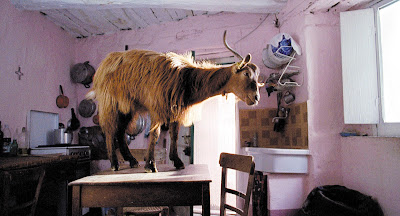TrustMovies does not read any press material handed out at screenings or with DVD screeners until he has first seen the film at hand. He makes his critical judgments based on whatever he can garner from what's he's seen, rather than from what he will later read that the filmmaker (in this case, writer/
director Michelangelo Frammartino, shown at right) and his distributor (Lorber Films) might want him to know. This may be unfair to the movie people, but it is fairer, I think, to my readers, who will be plopping their tushies down into $10 to $12 dollar seats without benefit of this "additional information." Regarding Le Quattro Volte, I don't think I've ever read a press kit, post-screening, more filled with surprise information about what I had just seen. Perusing it, I found myself murmuring time and again, "So that's what that scene was meant to convey!" or "That's what that moment was about!"
If the above sounds off-putting, I absolutely do not mean it to be. Le Quattro Volte is in many ways a wonderful piece of "art" film-making. Consistently beautiful to view, it sets you down in the middle of a place (a small mountain village in Calabria, Italy, above) and of lives (the townspeople, in particular an old shepherd and his herd of goats, below) that you would likely never get near in your own lifetime.
Because there is no audible dialog -- other than ambient sounds of townspeople occasionally talking (that you cannot quite understand, and for which no subtitles are supplied) -- and not a lick of narration by anyone, you simply have to keep your eyes and mind constantly on alert to figure out what is happening and why. This is challenging, and if you go to see this film with a companion, I wager you'll spend time immediately afterward, asking each other questions and exchanging viewpoints.
The movie opens on a gray/white screen, which, after a few moments, we determine is a kind of mist. This is coming up from ... ovens in the ground? So it seems. At first Frammartino's camera remains stationery from place to place, and we think we may be in for something Ozu-like. But no. Soon, he is moving that camera when necessary, taking us to church, to bed, to pasture and elsewhere
We're involved in all this, but often as much by the kind of game the director is playing with us, as by the film itself, which, though not officially a mystery, is still downright mysterious. And sometimes very amusing. A truck arrives in town and from it come what looks like extras in a Roman sword-and-sandal epic. But no, it's some sort of ceremony/pageant (above) for which the townspeople and their priest then leave. A young woman, arriving late for this event, is met by a barking dog which scares her and at which she tosses a stick. This leads, step by step, to one of the funniest movie scenes in recent memory and from there to the famous shot you see below (and on poster, top).
Ah, yes: those goats. You may be put in mind, as was I, of the documentary Sweetgrass, but as movie actors, these goats surpass those sheep by miles. They're as funny and versatile as they are fun to watch, and even their bleating sounds more interesting, individual and resonant than does that of the sheep. We actually witness the birth of one goat, below, and follow its progress until, well, you'll see...
So little do we get to know the humans in this film (including our leading man, that shepherd) and so little happens on one level (on another there's everything here from birth to death to car wreck to lumber-jacking, seen below) that the movie could easily be classified as an "experimental film." Yet I wager that it will linger longer than a lot of other things you'll view this year.
Le Quattro Volte, from Lorber Films, opens this Wednesday, March 30, at Film Forum in New York City. You can learn of dates, screening times and even buy tickets by clicking here. To see cities, dates and theaters, where the film will be playing across the country -- including Hawaii! -- click here, and scroll down.
********
As a courtesy to my readers (via the courtesy of Lorber Films, of course), I am giving you the link to that exceptional press kit for the film. But I urge you to see this movie first, challenge yourself to make the necessary connections, and then read the press materials to expand your understanding -- and probably enjoy some interesting surprises.











No comments:
Post a Comment